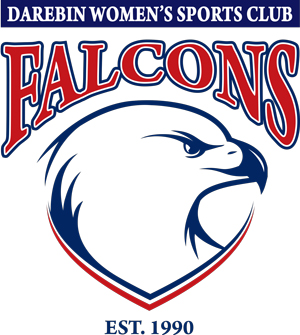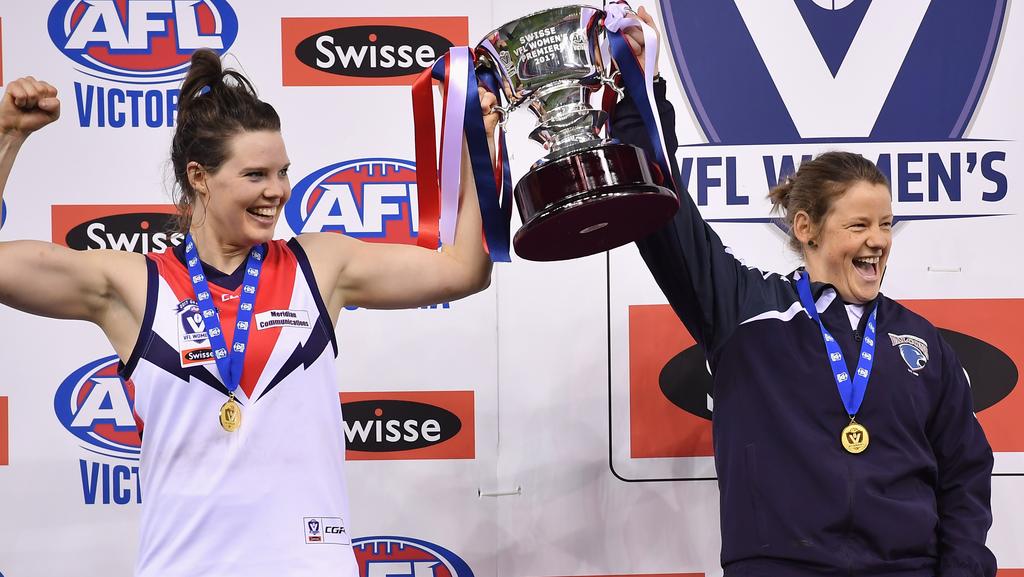After the high of five consecutive Aussie rules senior premierships, the Falcons were perfectly placed to continue their dominance. And in a fashion, they did. The senior team made the grand final in both 2011 and 2012, but there was no fairytale end with the team denied another flag both years.
On the coaching front, there was some instability throughout 2011, which was reflected in the grand final result. “We weren’t quite settled through those two periods in terms of our leadership from the coaches down,” Jane Lange recalled. “And we had a couple of coaches come and go. And then some of the senior players kind of tried to take the reins a little bit through that period of time.”
After coaching back-to-back premierships at Youth Girls level, Richard Dal Pos took the senior coaching reins in 2012.
“And Richo, to his credit, he coached us in a way where he did introduce tempo footy to us, when to go fast, when to go slow,” said Aasta O’Connor, who joined the Falcons in 2010. “We won three flags off the back of what we called 30-30, which is just controlling the ball within a 30 metre kind of space—chip, mark, hold possession. And that’s not rocket science. But he was able to get a group of really talented players with a lot of X factor to play that team brand of footy. That’s a difficult thing to do as a coach.”
Richard took the senior team to the 2012 grand final—it was a narrow loss to Diamond Creek, but it gave them a taste of what they would be.
After two disappointing losses, it wouldn’t take long for the team to get back on the winners list. They started with the 2013 season. It was a year that represented a changing of the guard with fresh new faces—soon to be household names—like Darcy Vescio, Katie Brennan and Elise O’Dea in the mix.
“It was almost like the next breed of Darebin people taking their spot as senior players,” Aasta said. “All these sort of famous solid senior footballers who Pete had developed and now they’d all sort of retired or stepped away from the game to have families and that sort of thing and there was us, the babies I guess, myself, Daisy Pearce, Loz Arnell, you introduce Melissa Hickey who’s in that group as well. You introduce Elise O’Dea and Katie Brennan and all of a sudden our line up was looking, we were young, but there was a lot of talent in that group.”
The 2013 season also featured the first ever women’s Aussie rules exhibition game—the precursor to the AFLW competition. Ten Falcons were drafted to the Melbourne and Western Bulldogs teams with seven players taken in the top 20. It speaks to the depth of talent in the club and foreshadowed the way in which the Falcons would help to shape the AFLW in later years.
The players drafted from Darebin in 2013 were Daisy Pearce (1), Aasta O’Connor (4), Karen Paxman (6), Melissa Hickey (11), Lauren Arnell (12), Rebecca Privitelli (14), Elise O’Dea (16), Katie Brennan (22), Jess Dal Pos (46) and Natalie Wood (50). Jane Lange also played a role as an assistant coach with the Western Bulldogs.
Back at clubland, more premierships would follow in 2014 and 2015 alongside individual accolades, too. Daisy collected the Helen Lambert Medal, the VWFL’s best and fairest award, in 2011, 2013, 2014, 2015 and 2016.
Throughout this period, with women’s football gaining more prominence, the Falcons continued to lift the bar. There were pre-season fitness camps and the club hired its first strength and conditioning coach, Tennille Hay, in 2015. Then in 2016, Jane Lange took over as playing-coach and led the premier team to its fourth consecutive premiership.
It’s a moment that stands out to Daisy. “Playing coach. I think this is awesome too. Like a playing coach in the VFLW. You won’t see that ever again. We won the Premiership [with] a playing Premiership coach.”
Jane, who retired from playing at the end of the 2016 season, but continued to coach in 2017, credits Peta Searle with giving her the belief to take on the job.
“[Peta] kind of just instilled that level of confidence that perhaps I was able to do the coaching thing in some capacity, and that was kind of the first little kick start into it… she definitely gave me that level of confidence that I was able to offer something in that space. And I’m forever grateful for that, because I’ve had some awesome experiences as a coach.”
As Jane took over the coaching of the senior team, it was a heady time for the club and for women’s Australian rules football. Changes were afoot in the state league and the AFLW was on the horizon.
In 2016, AFL Victoria created the VFL Women’s competition, replacing the VWFL Premier Division. The Falcons were one of the clubs to field a team in this new competition with theour premier team now playing under the VFL mantle. This signalled a huge change to the women’s football landscape in Australia with the establishment of the VFLW – on level with the men’s VFL – as the premier level of football in Victoria.
For a season, the VWFL continued and the Falcons entered our second team in what was now called Division 1. True to Falcons form, they made it to the grand final, however ended the season as runners up.
That first, 2016, premiership under Jane Lange was therefore the inaugural women’s premiership in the VFLW. While still celebrating thise 2016 premiership, the Falcons watched 16 of their players get drafted to the AFLW. Daisy Pearce, Melissa Hickey, Darcy Vescio and Katie Brennan were selected as marquee players, becoming the face of the new league and soon after household names and cult figures. Lauren Arnell, Jess Dal Pos and Karen Paxman were selected as priority picks, Libby Birch and Nat Exon as rookies and Elise O’Dea, Aasta O’Connor, Nicole Callinan, Brooke Patterson, Lauren Pearce and Kate Tyndall were drafted. Meghan McDonald was picked up as a free agent and Jane Lange was hired as an assistant coach at Carlton. Suddenly, the Falcons had a profile outside of their women’s community sport bubble and it seemed that everyone was excited about this club called the Darebin Falcons.
At the end of 2016, the face of women’s footy in Victoria changed further with the disbanding of the VWFL competition. was disbanded This was very much the end of an era and the momentous role played by the founders, leaders and all those women who played over the 36 years of the VWFL are to be celebrated. Without them, there would be no AFLW.
With the demise of the VWFL, Darebin’s second, Division One team joined the Northern Football Netball League in 2017. The popularity of AFLW led to an influx of new players and the Falcons fielded three senior women’s teams for the first time in its history: VFLW, Division 1 NFNL and Division 2 NFNL.
The 2017 season would be a defining one for the Falcons with plenty to celebrate but just as many challenges. One game stands tall among the rest—a kind of metaphor for what the Falcons have always been about. Sometimes struggling, fighting for survival but also for equality, but always doing things their way.
That game is the 2017 VFLW Grand Final.
Off the back of the first AFLW season, played between 3 February and 25 March 2017, a large portion of the team had played three seasons back-to-back without a break. By the time the finals rolled around, the players were exhausted. In the bye week before the finals began, there was a state game organised by the AFL—Victoria versus the All Stars.
“It was obviously the worst timed game you could possibly imagine,” then coach Jane Lange recalled. “Our girls were exhausted. And… the number of players that we had playing in that game, obviously meant that we had a good side. But… there’s a large portion of them that physically weren’t really in a great spot to play.”
“It was a really tough season because we had so many girls that had just played their first big exhausting, all-encompassing AFLW season,” Daisy says. “Even though it was only short, it was still very physically and mentally draining on everyone. And then we had to back up like a month later to play in a VFL season. And suddenly to have so many AFLW players was a disadvantage because we’re all burnt out and having to be managed.”
Player management wasn’t something the club had ever had to deal with, in any sport. “That year was definitely challenging… having to communicate really quite closely with the AFLW clubs, like to work out who could play and who couldn’t play and all the time periods of rest,” Jane says. It signalled serious change was about to happen.
The Falcons went into the 2017 grand final as the underdogs against a Diamond Creek outfit that had beaten them two weeks earlier. It was a game somewhat reminiscent of the Falcons first Aussie rules premiership way back in 1996, when the team transcended. “If you watch the first quarter of that game I dare you to find another AFLW game where the skills are that good,” Julia Chiera said. It was a game played on a big stage—at the Docklands Stadium in Melbourne, in front of thousands of people and televised live. It was a huge moment and Darebin was not about to fall.
“I get goosebumps, even just kind of… thinking about it. And I feel emotional about that period of time, too,” Jane said. “It was definitely a culmination of how far we’d come as a club, but also we deserved to come that far because of the work that had gone in by countless women before us.”
The Darebin Falcons prevailed that day. They beat Diamond Creek. They achieved their second run of five consecutive premierships. They made history. They won.
“It’s not the win in itself, it’s kind of like the win [was] for the people who have gone before us and the opportunity that they’ve been able to create for us and, and also out there to the universe that we are the community club,” Jane said. “We didn’t have backing from an AFL club, we didn’t have a heap of money going around…we were kind of the shit kickers in terms of that stuff. But that didn’t matter, because we had people who were good. We had good people, we had good players, but we had really good people and they wanted the club to be the best they could.
“It was really special and when that siren went that was that’s what’s going through my mind. Also a bit of a ‘cop that’,” Jane said.
Katie Brennan would go on to win the VFLW league best and fairest in 2017 capping off an extraordinary year for the club. But it would be the beginning of considerable change. In 2018, the VFLW competition transformed again. AFL clubs were admitted and all other community clubs—with the exception of Melbourne Uni who were aligned with North Melbourne—left the competition. Darebin decided to forge ahead as a standalone club. A majority of the Falcons stars were now tied to AFLW/VFLW Clubs and were not released back to play with the Falcons as had been the case in 2017. They finished fifth that year and missed the finals—the first time in more than a decade.

